QR X-PR: For $4,495, 12-Speed Electronic Shifting and Adjustability
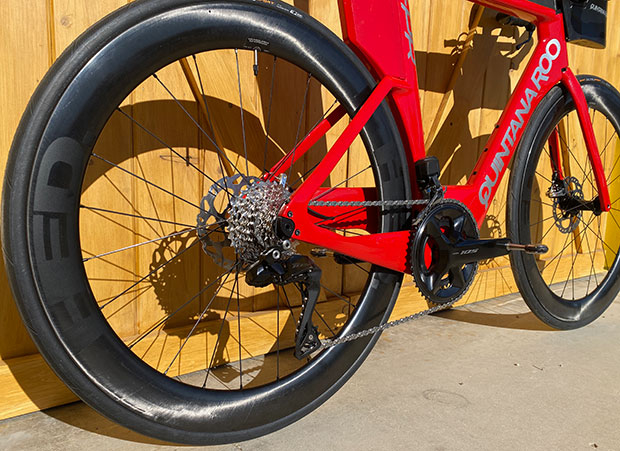
In my opinion the bike industry is in a design cul-de-sac. It's pursuing multiple dead ends, in fact. The big one is the inability to make a road bike that is sufficiently adjustable but that you still want to buy. This results in a lot of people choosing to ride uncomfortably aboard bikes that are 15 seconds faster over 60 miles. On the plus side, these owners can rest in the discomfort of knowing their bikes have hidden cables. But I’ll leave that one alone for now since it’s not germane and since I’ll have about 20 or 30 more times to waterboard bike brands over this between now and midsummer.
The other squeeze is felt by tri bike makers and this X-PR I’m writing about today is illustrative of the progress these companies are making. While road bikes have gotten less and less adjustable over the past decade, tri bikes are made with larger adjustment windows; with tighter increments between adjacent available fit coordinates (you can move your pads 5mm fore and aft rather than having to settle for 15mm increments); these adjustment windows conform to actual usable positions; and the bikes handle well when you’re in those positions. So where’s the squeeze?
It’s money, really. Tri bikes these days with their 12 rear speeds; and long distances between shifters and derailleurs; and the desire to shift the bike at the pursuit position as well as the bar ends; with the need to shift more frequently than other disciplines; really want to be electronically shifted. There is no discipline in cycling that wants electronic shifting more than tri. But it’s hard to stomach $7,500 or $9,500 for a bike. I just spent $4,000 for an electronic road bike (more on that later) and even that was a big ouch.
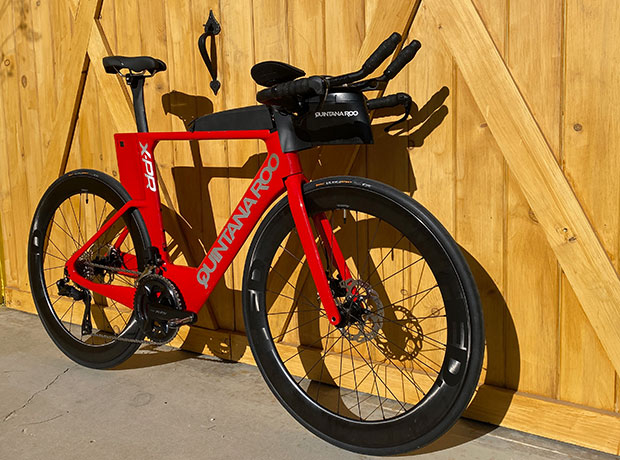
Here then is a new build of the X-PR, which is Quintana Roo’s almost-flagship tri bike. It is at this point that the vocal Slowtwitchers, whom I love, heap scorn on me for even suggesting that the X-PR is a wallet-friendly bike, because when I wrote about its close cousin’s launch less than 18 months ago the flagship V-PR’s frameset alone cost $5,350 with complete bikes costing between $8,000 and $12,000. I wrote about the X-PR’s launch last May and even then the mechanical build would cost you $5,195. The X-PR you see here will cost you $4,495 during QR’s winter sale, with Shimano’s 105 level 12-speed disc brake electronic groupset. This is a big deal.
What’s notable about this bike is that $4,495 is for a top caliber frameset (the exact silhouette of the V-PR) and 12-speed Shimano electronic shifting. Let’s go back 8 years: Felt’s signature achievement was the IA 10, with electronic shifting, at $4,999. Everything about this new QR X-PR is lighter, stronger, more adjustable, with shifting at the pursuits, more gears in the back, better parts throughout, much better aerobars. Yes inflation has taken a toll on us, and from 2015 to 2023 the price of the entry level tri bike rose by more than 50 percent (from $2,000 to $3,200). But this bike I’m writing about today is $500 less than that Felt IA 10 from the mid-teens and that Felt bike was the only electronically-shifted tri bike selling for $5,000.
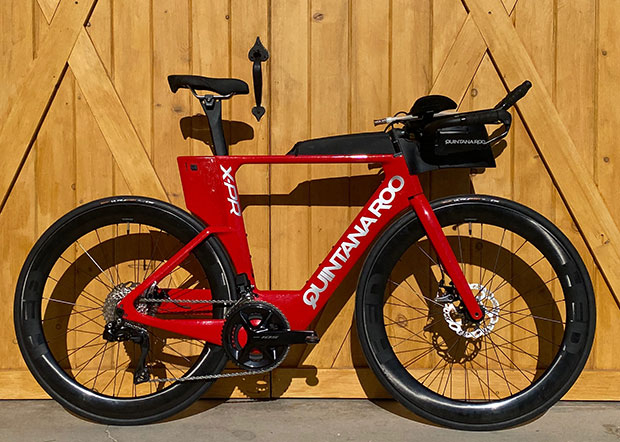
For sure, you’ll want to contemplate some upgrades to this X-PR’s build. The bike you see pictured here has HED Vanquish wheels front and rear rather than the very vanilla set of Shimano OE road wheels at that $4,495 price but let’s be honest: there are certain products that are pretty individual. Me? I’m pretty much done riding really deep front wheels, because I don’t bounce as well as I used to when I hit the pavement. My wheel needs are particular. Were I buying an aero wheelset today and for me it might be a HED 180 in the rear and a Zipp 454 in the front. Whatever QR puts in their configurator is probably not going to suit me so, fine, sell me the bike with the cheapest wheels you can (because I can always use a spare set of modern, thru axle, centerlock wheels).
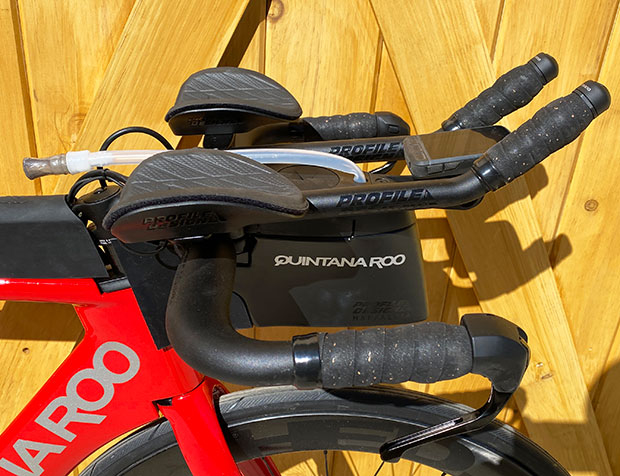
I’ll also change what’s on the front of this bike. I like full length forearm supports – always have – and have been riding them in one form or another on my bikes for a decade and a half. The rest of the world has caught up, thankfully, so I have some production options (I used to McGuyver my own aerobars). Profile Design is what comes on this build of the X-PR: the Wing 10A pursuit bar and Sonic 35a extensions. They work. But I have a different Profile Design option that I’ll show when I display this bike again in a couple of weeks built the way I ultimately prefer it for my own training and racing.
Speaking of QR’s online configurator, it is industry leading. Here’s how you get to it, and I encourage you to give it a whirl whether you intend to buy this bike or not. Know that this is where the bike industry is going, at the mid to high end. In 5 years, this is going to be the norm. Pick your frame color and graphics; your decal color; your components; and it gets built your way in 2 or 3 weeks. ABG (QR’s parent) has a pair of paint lines working multiple shifts at its Chattanooga factory. It makes its own decals and assembles its own bikes. Nobody has this but ABG and Trek, with its Project One process. Every bike brand is scrambling to get out of China as fast as it can and many aspire to eventually offer what QR is doing now.
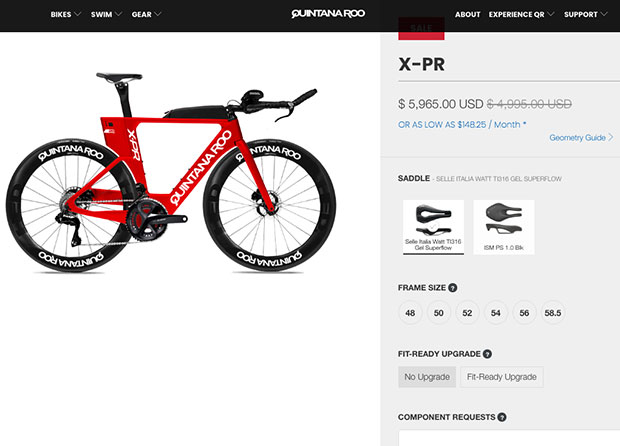
See that Fit Ready option in the configurator? I wrote about this about a year and a half ago. This is where you give QR your fit coordinates (just like you give our bike fit experts your coordinates for our bike fit assistance threads in our Reader Forum), and QR assembles the bike to those coordinates. You might not think this is a big deal until you have to cut or add cables or housing or hydraulic line to make a bike work once you adjust the bike at home. Then, QR ships you your bike either ready to assemble and hike your leg over in 30 minutes from the box arriving; or handed to you white glove delivery. If you don't know what size to buy in a QR tri bike go to the Quintana Roo Fit Assistance Thread on our Forum and you and I will work this out.
That Felt IA 10 I wrote about some paragraphs up: Felt really had to work to get that bike under $5,000. Spec suffered. Shifting suffered, as the chain and chainrings were off-spec. Not so this QR. When they say that it's a Shimano 105 group, they mean it: crank, chainrings, chain, cassette, and shifters are all 100% Shimano. If you wanted to poke at anything that you might consider chintz-spec it would be the mechanical instead of hydraulic brake — TRP with Shimano rotors. Fair point. But having had both cabled and hydraulic disc braking on my tri bikes I’m not so sure cabled is a downspec. I have at times really struggled to get a tri bike into a bike box for airline travel and one value to the brake that comes on the bike I’m showing you here is the ability to dis- and reconnect the cable from the caliper without having to bleed brakes and without hydraulic fluild all over the inside of the bike case.
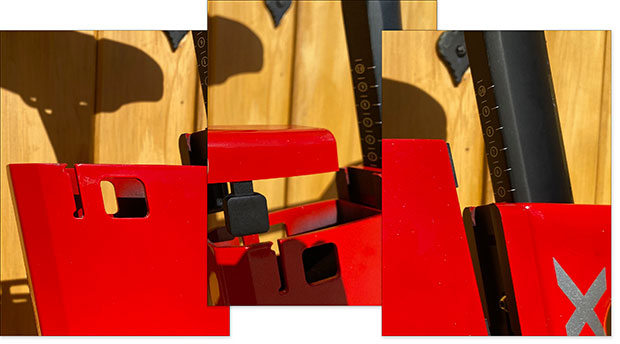
One final thing about this bike. As with all bike brands and, heck, automobile brands QR has had its hiccups with certain of its frame-specific accessories after they first come out. As in, do you want to be an early adopter? QR has worked most or all of those issues out. Take the rear storage as an example. This box now slots in and out without having to remove rear saddle hydration. (A montage of images above shows that box in various degrees of assembly.) But when QR first made that design change it made it possible for the box to pop out after hitting a vicious pothole. The box now has a tab on the lid that keeps the box in place come what may. There is a toolkit that comes with this bike that fits inside the box easily.
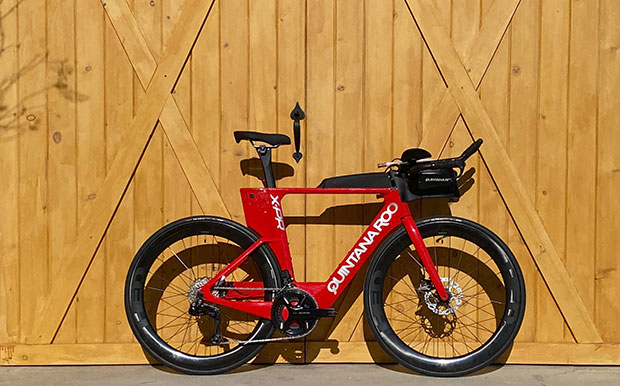
The box also has slots to affix behind it a Garmin Varia or other rear light. (I'm still messing around with the best way to mount my electronics on this bike.) All-in-all QR’s rear storage, top tube storage, hydration (in particular the custom-stylized Profile Design Aeria Hydration on this bike) have all been fine-tuned and reworked so that the PR series bikes are pretty headache-free.



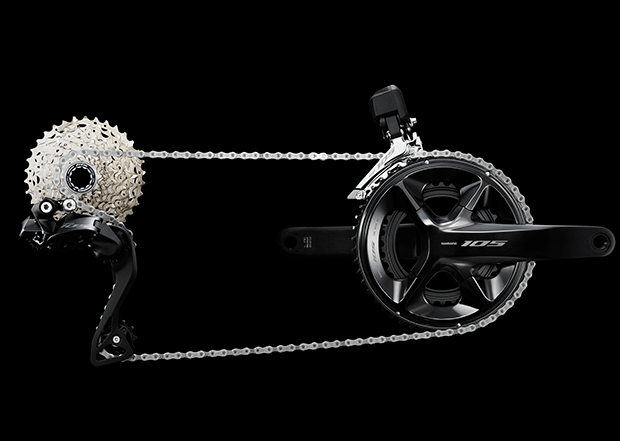
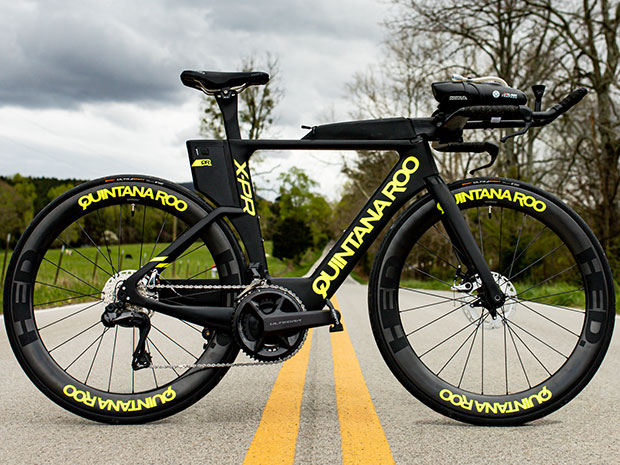
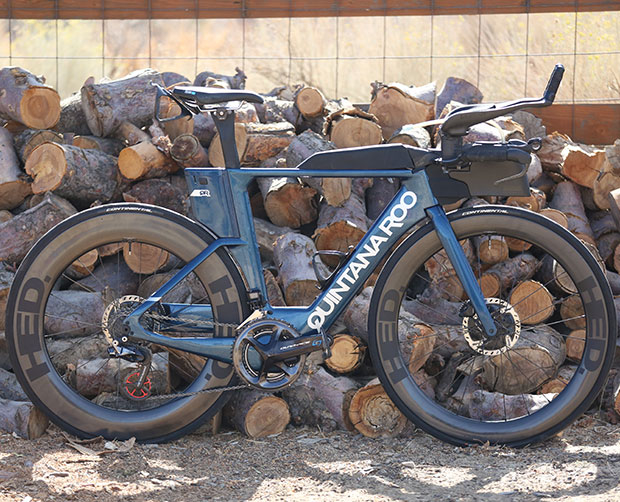

Start the discussion at forum.slowtwitch.com